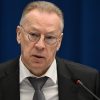The rise of violent extremism in Europe has been linked to the failure of migrants to integrate, in a hard-debated joint declaration by EU governments on the recent terror attacks.
The statement by EU home affairs ministers was described by Horst Seehofer, Germany’s interior minister, as a “great sign of solidarity” when delivered on Friday but it had been heavily watered down from a controversial initial draft.
After a week of disagreements over the contents of the proposed declaration pushed by France, Austria and Germany, references to Islam were removed along with demands for newcomers to learn the languages of their new home and “earn a living for oneself”.
The EU capitals nevertheless highlighted the need to improve social cohesion in Europe as part of its reaction to a spate of terrorist murders in Paris, Dresden, Conflans-Sainte-Honorine, Nice and Vienna.
“Integration is a two-way street,” the declaration said. “This means that migrants are expected to make an active effort to become integrated, while help in this regard is important.”
The statement issued on the fifth anniversary of the attacks in Paris, in the Bataclan theatre and outside the Stade de France offered few new policy initiatives.
Talk of sanctions against those who fail to integrate was removed and replaced with a softer warning to NGOs found to be breaking the law.
“Organisations that do not act in accordance with relevant legislation and support content that is contrary to fundamental rights and freedoms should not be supported by public funding, neither on national nor on European level,” the statement said. “Also, the undesirable foreign influencing of national civil and religious organisations through non-transparent financing should be limited.”
Earlier in the week, Charles Michel, the European council president and a former prime minister of Belgium, had called for the establishment of a European training institute to “train” imams.
The statement instead merely said the bloc should “promote that religious education and training – preferably within the EU – is in line with European fundamental rights and values”.
The initial draft of the declaration had raised concerns within the governments of the Netherlands, Sweden, Spain, Italy and Luxembourg about the linking of counter-terrorism with migration and the clear focus on “Islamism”.
The Dutch prime minister, Mark Rutte, had made the point during a joint press conference with the French president, Emmanuel Macron, and the chancellors of Germany and Austria, Angela Merkel and Sebastian Kurz, on Wednesday. The declaration was subsequently broadened to reflect concerns about the rise of the far-right, as well as Islamist terrorism.























































Свежие комментарии